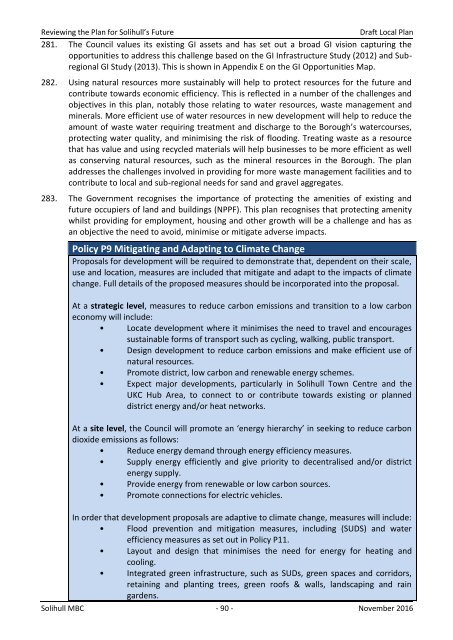Reviewing the Plan for Solihull’s Future
Draft_Local_Plan_05.12.16
Draft_Local_Plan_05.12.16
Create successful ePaper yourself
Turn your PDF publications into a flip-book with our unique Google optimized e-Paper software.
<strong>Reviewing</strong> <strong>the</strong> <strong>Plan</strong> <strong>for</strong> <strong>Solihull’s</strong> <strong>Future</strong><br />
Draft Local <strong>Plan</strong><br />
281. The Council values its existing GI assets and has set out a broad GI vision capturing <strong>the</strong><br />
opportunities to address this challenge based on <strong>the</strong> GI Infrastructure Study (2012) and Subregional<br />
GI Study (2013). This is shown in Appendix E on <strong>the</strong> GI Opportunities Map.<br />
282. Using natural resources more sustainably will help to protect resources <strong>for</strong> <strong>the</strong> future and<br />
contribute towards economic efficiency. This is reflected in a number of <strong>the</strong> challenges and<br />
objectives in this plan, notably those relating to water resources, waste management and<br />
minerals. More efficient use of water resources in new development will help to reduce <strong>the</strong><br />
amount of waste water requiring treatment and discharge to <strong>the</strong> Borough’s watercourses,<br />
protecting water quality, and minimising <strong>the</strong> risk of flooding. Treating waste as a resource<br />
that has value and using recycled materials will help businesses to be more efficient as well<br />
as conserving natural resources, such as <strong>the</strong> mineral resources in <strong>the</strong> Borough. The plan<br />
addresses <strong>the</strong> challenges involved in providing <strong>for</strong> more waste management facilities and to<br />
contribute to local and sub-regional needs <strong>for</strong> sand and gravel aggregates.<br />
283. The Government recognises <strong>the</strong> importance of protecting <strong>the</strong> amenities of existing and<br />
future occupiers of land and buildings (NPPF). This plan recognises that protecting amenity<br />
whilst providing <strong>for</strong> employment, housing and o<strong>the</strong>r growth will be a challenge and has as<br />
an objective <strong>the</strong> need to avoid, minimise or mitigate adverse impacts.<br />
Policy P9 Mitigating and Adapting to Climate Change<br />
Proposals <strong>for</strong> development will be required to demonstrate that, dependent on <strong>the</strong>ir scale,<br />
use and location, measures are included that mitigate and adapt to <strong>the</strong> impacts of climate<br />
change. Full details of <strong>the</strong> proposed measures should be incorporated into <strong>the</strong> proposal.<br />
At a strategic level, measures to reduce carbon emissions and transition to a low carbon<br />
economy will include:<br />
• Locate development where it minimises <strong>the</strong> need to travel and encourages<br />
sustainable <strong>for</strong>ms of transport such as cycling, walking, public transport.<br />
• Design development to reduce carbon emissions and make efficient use of<br />
natural resources.<br />
• Promote district, low carbon and renewable energy schemes.<br />
• Expect major developments, particularly in Solihull Town Centre and <strong>the</strong><br />
UKC Hub Area, to connect to or contribute towards existing or planned<br />
district energy and/or heat networks.<br />
At a site level, <strong>the</strong> Council will promote an ‘energy hierarchy’ in seeking to reduce carbon<br />
dioxide emissions as follows:<br />
• Reduce energy demand through energy efficiency measures.<br />
• Supply energy efficiently and give priority to decentralised and/or district<br />
energy supply.<br />
• Provide energy from renewable or low carbon sources.<br />
• Promote connections <strong>for</strong> electric vehicles.<br />
In order that development proposals are adaptive to climate change, measures will include:<br />
• Flood prevention and mitigation measures, including (SUDS) and water<br />
efficiency measures as set out in Policy P11.<br />
• Layout and design that minimises <strong>the</strong> need <strong>for</strong> energy <strong>for</strong> heating and<br />
cooling.<br />
• Integrated green infrastructure, such as SUDs, green spaces and corridors,<br />
retaining and planting trees, green roofs & walls, landscaping and rain<br />
gardens.<br />
Solihull MBC - 90 - November 2016


